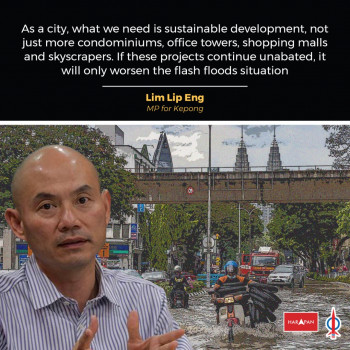By Liew Chin Tong
The current practice of Prime Minister doubling as finance minister must end immediately. Or else, Malaysia will suffer under a “part-time” Finance Minister. The Malaysian economy is faced with a myriad of challenges ahead, which requires a competent full-time Finance Minister to steer it away from troubled waters.
Over the short and middle-term horizon, the Malaysian economy may face the following challenges, particularly:
1) A potential slowdown
The various subsidy cuts (petrol, electricity, etc) and the impending introduction of Goods and Services Tax are depressing domestic demand as more and more ordinary Malaysians complain about price hike. External demand is unlikely to rise too much due to weak job markets (hence inability to consume our products) in Europe and the United States. The combined effect could be a slowdown.
2) The impact of the tapering of Quantitative Easing
Somehow no one in the government has seriously discussed the impact of the tapering of Quantitative Easing by US Federal Reserve on Malaysia. It is quite likely that US Dollars will continue to appreciate vis-à-vis the Ringgit and at the same time interest rate will rise. What is in store for Malaysian business and the wider economy should the scenario take place?
3) A potential property bubble
There are signs that the property market is not necessarily sustainable. CIMB Chief Nazir Razak has warned about the potential bubble in office spaces in Kuala Lumpur while others are concerned about the “carpet building” of high-rise condominiums in the Iskandar region. If there is a bubble and when the bubble bursts, the public will certainly be adversely affected and the financial institutions may be riddled with debts that turn bad. Such scenarios are complex and require a competent full-time Finance Minister to steer.
It is farcical to see that the Deputy Prime Minister Muhyiddin Yassin who is also Education Minister is now chairing the Cabinet Committee on Cost of Living; as if cost of living is not part of the economic/finance portfolio.
There are too many actors in the economic/finance segment of the cabinet but there is no commanding voice that sets a clear agenda for the nation’s economic health.
The actors include:
• Muhyiddin Yassin, Chairman of Special Cabinet Committee on Cost of Living;
• Ahmad Husni Mohamad Hanadzlah, Minister of Finance II;
• Ahmad Maslan, Deputy Finance Minister and the Government’s No 1 Cheerleader for GST;
• Idris Jala, Minister in Prime Minister’s Department and CEO of the Government’s super-consultant unit Performance Management Delivery Unit (Pemandu);
• Abdul Wahid Omar, Minister in Prime Minister’s Department responsible for Economic Planning Unit (EPU)
• Mustapa Mohamad, Minister of International Trade and Industry
• Hasan Malek, Minister of Domestic Trade, Co-operatives and Consumer Affairs
This list is not exhaustive.
Apart from the Treasury (Finance Ministry) and the EPU (in the Prime Minister’s Department), Pemandu seems to have acquired the status of Government’s chief spokesperson on economics since 2010. Further, the National Economic Council was established in 2008 as a mini-economic cabinet that includes only key UMNO Ministers and top bureaucrats.
Chua Soi Lek was included in the Economic Council in November 2010 after I raised the matter.
There is also a newly established Fiscal Policy Committee that made decisions on subsidy cuts without full cabinet deliberations. The FPC, according to Prime Minister Najib Razak, “will play a lead role in strengthening public finances as well as ensuring fiscal sustainability and long-term macroeconomic stability of the nation.”
Such is the fragmented situation of economic governance in Malaysia.
Since the departure of Daim Zainuddin from his second tour of duty in the Finance portfolio in June 2001, the Finance portfolio has been the adjunct portfolio of Prime Ministers Dr. Mahathir Mohamad, Abdullah Badawi, and Najib Razak. The only brief exception was when Prime Minister Abdullah conceded the Finance portfolio to his deputy Najib on 17th September 2008.
The practice of the Prime Minister doubling as Finance Minister is an unhealthy trend for the country’s economy. And the complex and fragmented economic governing team is a clear signal that we have the wrong guy helming the Finance Ministry. The time has come for the appointment of a full-time Finance Minister to be the leading voice for sensible and coherent economic policies. Leadership matters.





It will be suicide if one minister holds multiple posts. Malaysia TAK BOLEH LAH
Don’t you ministers out there consider this comment is extreme then ignore them. What is considered moderate may be extreme to others.